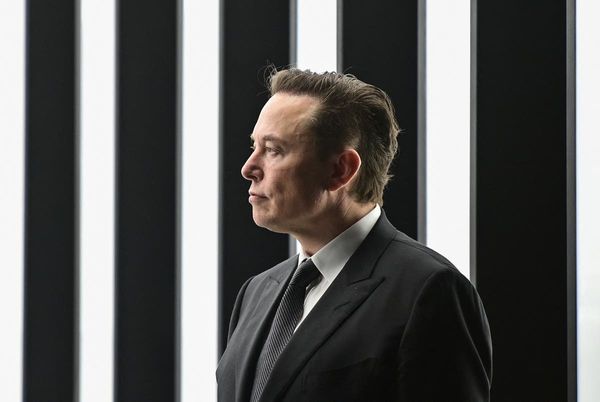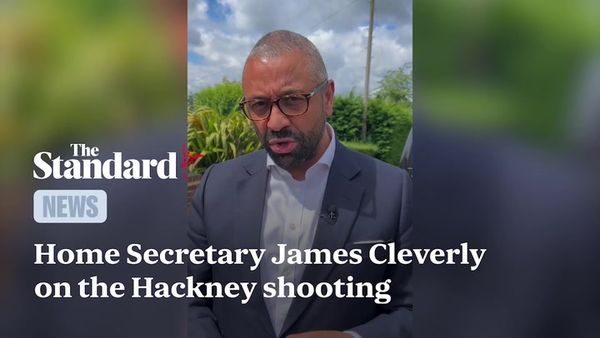
There are many familiar sides to the Rev Al Sharpton. There is Al Sharpton the preacher-protester, marching fearlessly through hostile white neighbourhoods in New York City; Al Sharpton the racial justice warrior, arm-in-arm with the mother of the latest police shooting victim; Al Sharpton the progressive TV host, pounding out his monologue on MSNBC.
Then there is the very unfamiliar image that fills the screen towards the end of Loudmouth, the new documentary on his life and battles. It shows Al Sharpton slumped to the ground, literally on his knees.
Never before seen archival footage captures him at perhaps his rock bottom. Sharpton looks forlornly up at the camera, clutching his chest where a white attacker has seconds earlier stabbed him with a 5-inch steak knife.
It is 1991 and Sharpton is in Bensonhurst, a white Italian-American area of Brooklyn where he staged 29 marches over 18 months to protest against the murder of Yusef Hawkins, a Black teenager shot by a crowd of white youths. More of the movie’s powerful footage shows white New Yorkers milling menacingly around the marchers, their expressions contorted by hate, shouting: “White power!” and “These [N-words] should be kept quiet, Al Sharpton go home!”
“It was a low point that ended up a high point,” Sharpton explained in an interview with the Guardian before the movie’s release. “The high point was when I said, ‘No matter what happens, I’m not going to stop.’ You never know how committed you are till you’re facing the unknown.”
Not stopping is one of the big themes of Loudmouth. The film tracks the civil rights activist from his famous confrontations in 1980s New York – the 1984 subway shooting of four Black men by Bernhard Goetz; the 1986 killing of Michael Griffith, an African American who was beaten and chased to his death by a mob in all-white Howard Beach in Queens; and the 1989 killing in Bensonhurst – all the way to his present-day championing of the families of police brutality victims including the eulogy he delivered in 2020 at the funeral of George Floyd.
The title of the film is a play on how Sharpton has sought to reclaim the many pejorative character traits that have been held against him. Over the years he has been called a publicity-hungry demagogue, a pudgy exhibitionist, a rabble rouser, race baiter, blabbermouth and buffoon.
He takes it all in, then spits it back out. Yes, he is a loudmouth, proudly so – in the New York of the 1980s you had to be if you wanted to fight overt racism. “Sometimes you have to be loud to make people know that is not the real story; you had to fight to make sure that you control the story,” he tells the movie’s director, Josh Alexander.
It was around the time of the Bensonhurst knife attack that Sharpton experienced a turning point. Up to then he had played it both ways: one day he would be the reformist seeking change from within in the mould of Martin Luther King, the next day he would be the firebrand agitator in the spirit of Malcom X. “As these racial killings started, I became more angry, I became Malcolm and Martin,” he said.
In the wake of the stabbing, Sharpton made a decisive shift toward the path of MLK towards legislative and policy change. The critical push was provided by Coretta Scott King, MLK’s widow. “She said to me, ‘You got to decide which road you’re going to take,’” Sharpton said. “It was the stabbing, and the admonition from Mrs King, that made me, for the last 35 years, walk one road.”
That contrast between militant youthful Sharpton and mature reformist Sharpton who is hosted by Barack Obama in the White House and chats on the phone to the Democratic Senate leader, Chuck Schumer, is glaring in Loudmouth. The early footage has him marching on the frontlines, his long hair waving in the wind, a gold medallion around his neck, dressed in a shiny nylon tracksuit.
In contemporary sequences, he is 175lb lighter, looking sharp in dapper bespoke suits and with immaculately coiffed hair. The bling has been replaced by a lapel badge of the National Action Network, the civil rights network he founded soon after the Bensonhurst attack.
Sharpton dismisses the superficial contrast in appearances. “They call it growing up. I’m 68, am I still supposed to be wearing platform shoes and bell-bottom pants?”
But he accepts that there was a key transition in that moment. “I never advocated violence. I held scores of marches, and none of them turned into a riot. We were very disciplined, but our language was not disciplined. I called people the N-word and whites names. Mrs King showed me that your language must reflect who you are.”

Loudmouth traces Sharpton’s potent influence on racial politics from a very young age – by 13 he was already a youth director in MLK’s organization, and by 16 he had formed his first civil rights group, the National Youth Movement. His impact was felt most keenly in New York and the north-east of the US, which had long been under the delusion that they were exempt from the scourge of racism that beset the deep south.
“I was saying to New York and north-eastern liberals, ‘You sit here in the comfort of thinking you are not like them down south. And you are, you just do it in a more manicured way.’”
The film explores two essential roots to his power as a change-maker: Sharpton the preacher, and Sharpton the performer. Sharpton the preacher emerged, remarkably, at the age of four when he was first invited to stand on a box in his Pentecostal church in front of 900 congregants.
“I started preaching, and I’ve been preaching ever since,” he said. “While most kids were playing softball or jumping Double Dutch, I was preaching to the live congregation.”
Sharpton the performer developed out of his long friendship with James Brown, whom he met through his activism as a teenager and who became his mentor and godfather in 1973. “I learned from James Brown that you’re going to have to be dramatic in order to get people to see things that they are not inclined to see. Especially in New York where you are competing with Broadway lights and Times Square – we had to do extraordinary things to get attention.”
He began putting the power of the preacher-performer to use. He forced the media to turn its spotlight on to the racial killings in Howard Beach and Bensonhurst through a string of marches, sit-ins and blockades of bridges and stations. He was arrested over 30 times for acts of civil disobedience.
There’s a striking parallel with another innate performer who has used his communications skills and celebrity status to move the crowd, albeit in the opposite direction. “The timeliness of this documentary is that it tells the country who and what Donald Trump came from,” Sharpton said.
“How he knew how to appeal to basic racism and homophobia, because he grew up in Queens, just a short distance from Howard Beach. In order to understand Donald Trump, you have to understand New York City – I understood it, because I grew up on the other side of the tracks.”
Sharpton draws a direct line from the Loudmouth footage of the white mob shouting the N-word in 1986 Howard Beach to Trump’s Maga world today. “There was no shame in the faces of those Howard Beach guys, they weren’t hiding from the cameras, just like on January 6, the people weren’t hiding. I saw the same arrogance, display of bigotry, that I saw on January 6 some 40 years ago at Howard Beach.”
Though the film is largely adulatory, it doesn’t shrink from addressing kinks in Sharpton’s record. The most acute of those was his adoption of the case of Tawana Brawley, a 15-year-old Black girl who was discovered in a garbage bag with racial slurs written on her body who claimed she had been assaulted and raped by six white men in upstate New York.

After seven months of a grand jury investigation, her story was found to be fabricated.
Though the Brawley saga has dogged Sharpton’s reputation over the years, he still chooses to stick with the line he struck in 1987. After 35 years, isn’t it time to change the framing to accept that mistakes were made?
“I might have had a different strategy and different language,” he replied. “But I still would have said that Brawley deserves her day in court, and she deserves to be investigated.”
If the 1980s material in Loudmouth is dominated by Sharpton’s confrontations with the New York white mob, the more recent takes concern his seemingly tireless advocacy on behalf of victims of police brutality. He reads out a list on camera of the cases he has taken on, and it goes on and on; in recent times he was there not just for Floyd but for Breonna Taylor, Ahmaud Arbery and, tragically, many others.
In his Floyd eulogy, he gave a characteristically double-edged assessment of modern America. Here was Sharpton the fiery preacher: “What happened to Floyd happens every day in this country – it’s time for us to stand up in George’s name and say: ‘Get your knee of our necks!’”
And here was the Sharpton who is full of hope for the future: “You changed the world, George,” he said. “We going to keep marching, George. We going to keep fighting, George. We going forward, George.”
So which is it? Which Sharpton is the real one: the one who keeps getting the call from bereaved Black families in an apparently never-ending litany of woe, or the Sharpton full of hope about a changing America?
“Yes I keep getting the calls,” he said. “But I also keep seeing people across demographics responding by coming out on multiracial marches. That wouldn’t have happened when I started.”
He sees hope, he said, in the fact that he was in Johannesburg the night in 1994 when the ANC won the first multiracial election and Nelson Mandela became South Africa’s president. He sees hope reflecting that he sat on the platform at the US Capitol when the first Black president was inaugurated in 2009.
“I’ve seen too many breakthroughs not to believe in breakthroughs,” he said. “My job now is to keep telling people in the dark night that sunlight will come if we can just hold on, and I’m going to do that for as long as I can.”
Loudmouth is now out in US cinemas with a UK date to be announced







